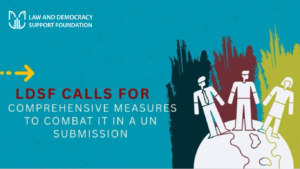
The undersigned Egyptian independent human rights organizations said that Egypt’s upcoming elections to the House of Representatives (HoR), scheduled for 10-11 November 2025, are occurring under chronic and severe restrictions on meaningful political participation. The authorities continue to curb independent political organizing, suppress peaceful dissent, and marginalize critics from public life, effectively preempting any potential for genuinely competitive elections. The vote is widely expected to reaffirm the authoritarian status quo rather than provide a democratic avenue for Egyptian citizens to freely choose their representatives.
Reopening the public sphere in Egypt urgently requires tangible measures to restore the rights to peaceful assembly, expression, and association, together with media freedom, which are foundational to political life and a functioning electoral environment. The Egyptian authorities should immediately end reprisals against peaceful political opponents, release persons detained for exercising their rights to expression and association, and allow all individuals and parties to engage in the electoral process without interference or fear of arrest.
In recent years and especially under the regime of President Abdel Fattah el-Sisi, the House of Representatives in Egypt has not been a mechanism for democratic representation or public accountability. Instead, the HoR has largely functioned to endorse and facilitate executive decisions, while failing to exercise effective oversight. The upcoming electoral process appears likely to reproduce this role, consolidating a legislative body that offers no checks and balances while barely providing token space for pluralism.
Prospects remain exceedingly limited for Egypt’s already fragmented and marginalized opposition. Years of sustained repression, including the dismantling of independent parties and civic organizations, have left the political arena almost entirely controlled by security agencies. Pro-government media figures have acknowledged these agencies control the HoR, and produce monitoring and evaluation reports on representatives’ performances. The well-established practice of security oversight of candidate selection and electoral list formation has essentially reduced parliamentary politics to a bidding war between regime loyalists. This has taken place alongside the systematic targeting of credible political challengers, exemplified by the arrest and prosecution of several prospective candidates in the last two presidential elections. Any public space where dissenting political views could be expressed safely has been effectively erased.
In the 2025 elections, Egypt’s National Elections Authority (NEA) disqualified three electoral lists and many opposition candidates on the grounds that they had been excluded from compulsory military service. This represents a new and arbitrary interpretation of the law: at least six of those candidates had run and won in previous elections without any issue regarding their military status. Exemption from military service in Egypt can occur for reasons entirely unrelated to wrongdoing, including family circumstances, political sensitivity, or being married to a foreign national. The NEA is effectively using military status as a political filter. Such exclusion lacks objective justification and violates international standards, including Article 25 of the International Covenant on Civil and Political Rights (ICCPR), which prohibits unreasonable or discriminatory restrictions on the right to run for office.
When assessing the legislative elections, it is no longer necessary to wait for indications of how severe and widespread the electoral fraud, intimidation and vote-buying will be this time. Egypt’s HoR, clearly dominated by pro-government groups since 2015, has become mostly irrelevant to Egyptian politics. It has not provided a counterweight, nor even oversight of the executive for many years, without a single parliamentary questionto the government in the past legislature. The HoR has eschewed critical and substantive debate on government policy, which has left unaddressed several waves of acute economic and social crisis that have fuelled widespread suffering and popular discontent. It has endorsed or strengthened draconian legislation proposed by the executive, such as the 2017 and 2019 NGO laws, the 2024 asylum law, and the new Code of Criminal Procedures. It has adopted laws of major import for the country without consulting stakeholders, without transparency and sometimes without even perfunctory discussion.
Egypt’s HoR remains a key instrument of authoritarian rule. Election campaigns now involve massive payments to the State-controlled Tahya Misr fund, allowing wealthy citizens to buy places on electoral lists. The Parliament also provides the required façade to allowfe Egypt to secure loans from its foreign creditors and reassure Egypt’s allies – so that the government can continue servicing its debt and investing in more unsustainable megaprojects that feed the patronage networks of the military, the main pillar of Sisi’s rule. Most importantly, the House of Representatives is indispensable for passing the constitutional amendmentsthat many expect will once again extend the president’s tenure.
For the Egyptian people, a democratic parliament is indispensable to reclaiming their right to shape their country’s future, which includes addressing its devastating economic situation and political deadlock. The parliament is the only institution capable of reflecting the diversity of public interests, safeguarding rights, and offering peaceful channels for reform. Depriving citizens of this not only perpetuates repression and inequality, but also ensures that economic hardship and political disillusionment will continue to intensify, with profound consequences for Egypt’s social cohesion and long-term stability.
For Egypt’s international creditors and its sorely needed national and international investors, a genuinely independent and democratic parliament is not a secondary concern; it is a prerequisite for economic credibility and long-term stability. Continued lending and investment in the absence of parliamentary oversight and transparency entrench a system where public resources are diverted through opaque networks of patronage and corruption, deepening the very crises such funds are meant to alleviate. Without an autonomous legislature capable of scrutinizing budgets, approving loans, and holding the executive to account, Egypt’s economic recovery will remain hostage to arbitrary decision-making and unaccountable spending.
Signing organizations:
- Cairo Institute for Human Rights Studies (CIHRS)
- Egyptian Front for Human Rights (EFHR)
- EgyptWide for Human Rights
- The Egyptian Human Rights Forum
- Egyptian Commission for Rights and Freedoms (ECRF)
- Law and Democracy Support Foundation e.V. (LDSF)
- El Nadim Center
More Information:






